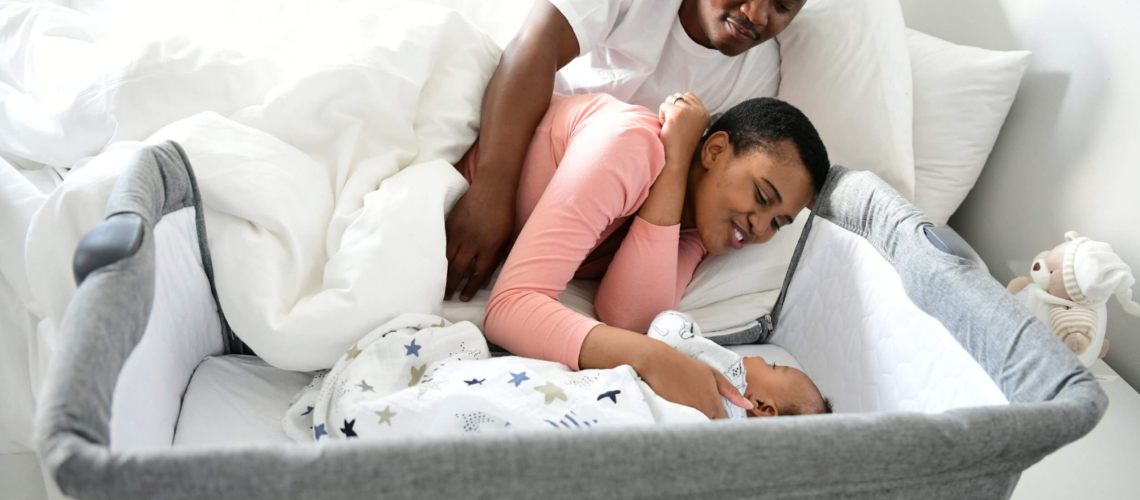Good Night Consultant
Being a parent, means that at some point in your life you will find yourself co-sleeping with your child. It might be by personal choice, because they are sick, out of desperation or it might be because you are on holiday and spare beds are limited.
When is it a good idea and when is it not? Honestly, that decision remains yours as parents. Co-sleeping is seldom a problem if both parents enjoy it and if all parties involved are actually sleeping. I find that co-sleeping is unlikely an issue, it’s co-waking that is the enemy.
I find that most bed-sharing families fall into one of these categories:
- Parents who are reactively co-sleeping because their child doesn’t sleep any other way. (These parents often want the child out of their bed.)
- Parents who are co-sleeping and are ok with it but wish that they all slept better.
- Parents who are temporarily co-sleeping for a specific reason. (Their goal is not long-term bed-sharing)
- Parents who are co-sleeping and have no intention of stopping because it is working for them. (These parents don’t need our help.)
Let’s discuss some important factors to consider.
Is my child safe?
As far as infant death goes, suffocation is recorded as even more prevalent than Sudden Infant Death Syndrome (SIDS). Co-sleeping with your infant poses huge risks. Follow the WHO safe sleep guidelines and only move your baby to your bed when they are older and it is safe to do so. Ancient tribes would bedshare with their infants, but we need to remember that their beds were remarkably different from ours. They did not have fluffy duvets and cushions and they did not have soft mattresses raised high above the ground. They slept on hard floor beds and the moms used to sleep away from the family in a protective ‘cocoon’ shielding the infant from danger.
Is it true that as humans we are designed to have our children sleep with us?
Yes, almost certainly, after all, if we look at some of the older tribes around the world, we do, of course, see that children do not usually sleep alone. This fact has created a strong movement encouraging parents to accept that the child should sleep with them, after all, that is what has happened for thousands of years.
There is only one major flaw in this argument, and it is this; as humans we were also designed to live in groups/tribes/ large extended families etc. This then means that when a mother needs to sleep, there were always other arms around to hold and soothe her child. Moms got breaks and had sufficient time to themselves. This is unfortunately not the world that we currently live in today. Today we have single parents or couples trying to do it all on their own.
When parents are sleep deprived, they cannot be the parents that they want to be. Therefore, quality sleep is vital in our generation and these families deserve sufficient sleep, regardless of their personal preferences with regards to where their child sleeps.
Is it not better for my child from an emotional or attachment perspective if I am readily available?
When it comes to the emotional regulation of our children, one of the most important factors is having an adult that is available to meet their needs. The adult need not be in the exact same bed as the child for this to be their reality. We don’t live in huge castles; we are usually a short walk away from the child if they genuinely need us.
Please also take note that attachment is not necessarily formed during sleep, but rather in the hundreds of ways that we interact with our children during the day.
Shouldn’t a mom make sacrifices for her child?
Motherhood naturally comes with certain sacrifices. We need to acknowledge though that BOTH parents and child need good quality sleep. It should not be a matter of sleep for the child at the expense of the parent. You know what is detrimental to a child, a parent that is so sleep deprived that they are running on empty. That parent won’t have the capacity to help their child learn to regulate, meet their emotional needs, and build a stronger parent-child bond.
What about sleep training?
Children CAN sleep well when they do not sleep with a parent, we see this in countries all over the world. Children can also learn to sleep well even when they DO sleep with their parents. Sleep will always remain a skill that your child needs to develop, as well as implementing appropriate bedtime boundaries with our children.
You cannot fault the parents who share a bed with their child because they all love the proximity, any more than you can fault the parents who need their own space at night because without sufficient sleep they wake up irritated.
If your child is either in their own room or in your bed and your sleep habits and that of your child are not optimal, please reach out for help. We will discuss your personal preferences, parenting values and help you make an informed decision on what is best for your unique family and how we can help you achieve your goals.
#sleeptraining

